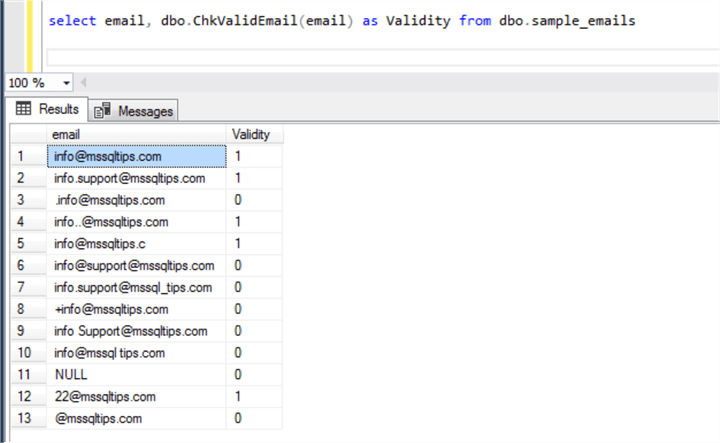By: Matteo Lorini | Comments (3) | Related: > Functions User Defined UDF
Problem
In this world of instant notification, having a valid email address is very important. From an organizational perspective, this allows companies to market their products and stay in touch with customers and prospective customers. It has become critical for an organization to have the correct email address of their customer. Many CRM tools, like Salesforce, have email as a data type which allows for very stringent rules determining if an email is valid and won’t store an invalid email. In TSQL, we donít have an email data type, so how can we check that an email format is valid?
Solution
In this article, I will go through a SQL Server function to validate the format of an email address. This function will take into account the different rules of determining a valid email.
Email Syntax
If you want to dig into the email standards, you can look at RFC 8398.
In a nutshell, we can define a valid email format like the following:
- local part (core part of the email like name.lastname or info or support)
- @ (at sign as a separator)
- domain name (like mssqltips or gmail)
- domain extension (like .com, .net, .org)
It should follow these rules:
- An email needs to have all the above parts to make it valid. Therefore something like this '_%@_%._%'.
- The email cannot contain spaces.
- It cannot contain some special characters like #, %. It is not allowed by some domains.
- The domain or subdomain name can contain special characters like - and . only.
- The first and last character of the email cannot contain some of the special characters.
- There cannot be more than one @ sign in the email.
TSQL Function to Validate Email Addresses
Here is a function that returns 1 for valid email address format and 0 for invalid address format.
CREATE FUNCTION dbo.ChkValidEmail(@EMAIL varchar(100))RETURNS bit as
BEGIN
DECLARE @bitEmailVal as Bit
DECLARE @EmailText varchar(100)
SET @EmailText=ltrim(rtrim(isnull(@EMAIL,'')))
SET @bitEmailVal = case when @EmailText = '' then 0
when @EmailText like '% %' then 0
when @EmailText like ('%["(),:;<>\]%') then 0
when substring(@EmailText,charindex('@',@EmailText),len(@EmailText)) like ('%[!#$%&*+/=?^`_{|]%') then 0
when (left(@EmailText,1) like ('[-_.+]') or right(@EmailText,1) like ('[-_.+]')) then 0
when (@EmailText like '%[%' or @EmailText like '%]%') then 0
when @EmailText LIKE '%@%@%' then 0
when @EmailText NOT LIKE '_%@_%._%' then 0
else 1
end
RETURN @bitEmailVal
END
GO
Let's create a table, insert random correct and incorrect email address then execute the function to verify the email addresses.
create table dbo.sample_emails ( email varchar(50) )GO
-- Insert email values
insert dbo.sample_emails values
('[email protected]'),
('[email protected]'),
('[email protected]'),
('[email protected]'),
('[email protected]'),
('info@[email protected]'),
('info.support@mssql_tips.com'),
('[email protected]'),
('info [email protected]'),
('info@mssql tips.com'),
('NULL'),
('[email protected]'),
('@mssqltips.com')
GO
Finally, let's test our email function.
select email, dbo.ChkValidEmail(email) as Validity from dbo.sample_emails
We can see the results below. If it is a 1 it is a valid format and 0 is an invalid format.

Conclusion
Different CRM tools can have different email rules. Also different domains have different rules for creating email addresses. This function is just a generic one and can be modified as per the requirement.
Next Steps
- I18N Mail Addresses in X.509 Certificates
- Check out these tips
- Automated Notification Email for SQL Server Object Modifications
- How to setup SQL Server alerts and email operator notifications
- Sending mail messages from SQL Server
- SQL Server Database Mail configured with the Send Grid Email Service in the Azure Market Place
- Setup SQL Server Database Mail to use a Gmail, Hotmail, or Outlook account
- Generate HTML Formatted Emails from SQL Server
- Storing E-mail addresses more efficiently in SQL Server
About the author
 Matteo Lorini is a DBA and has been working in IT since 1993. He specializes in SQL Server and also has knowledge of MySQL.
Matteo Lorini is a DBA and has been working in IT since 1993. He specializes in SQL Server and also has knowledge of MySQL.This author pledges the content of this article is based on professional experience and not AI generated.
View all my tips






